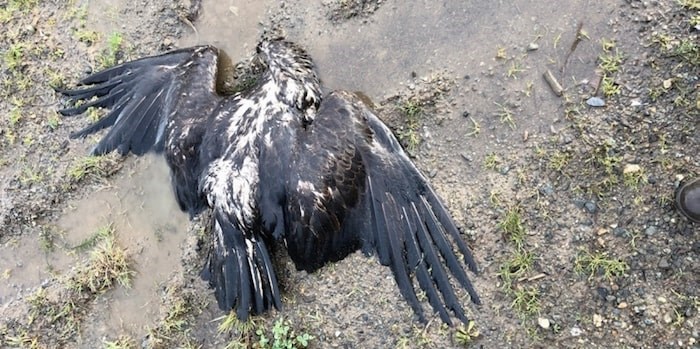Six bald eagles have died and another six are recovering after possibly ingesting some type of poison in an area north of Duncan, the Raptor Rescue Society said Sunday.
Robyn Radcliffe, executive director, said the society began receiving calls last Wednesday about sick or injured eagles in the Herd Road area of North Cowichan.
 Bald eagle was found dead in Herd Road area of North Cowichan. Photo courtesy Raptor Rescue Society
Bald eagle was found dead in Herd Road area of North Cowichan. Photo courtesy Raptor Rescue Society
โWe had two calls in the morning about two different eagles in a similar location,โ she said.
The society recovered the eagles, which were both alive, and took them to the Island Animal Hospital in Nanaimo.
Then, on Saturday, the society received a call from a conservation officer who had received a report of two more eagles in the same area โ one dead and the other sick.
โIt was in a very similar location, so we realized, โOK, we better start searching; this could all be related,โโ Radcliffe said.
โWe started searching and in the next two hours we found another eight eagles.โ
Of the six that are still alive, Radcliffe said the two rescued last Wednesday are now in the societyโs care and doing well.
โFingers crossed that they should be released in the next one to two weeks,โ she said. โItโs not a huge recovery time if we can catch it in time and treat it like this.โ
The other four eagles were still at Island Animal Hospital Sunday.
Veterinarian Dr. Ken Langelier said one of the birds has developed pneumonia, but he remains hopeful that all of them will eventually be released.
โWe have had cases like this before,โ he said. โIn the late 80s, I actually had 29 bald eagles brought in all at once that had been feeding on the carcass of a cow that had been euthanized.
โSo my suspicion is that some animal has been euthanized with pentobarbitol and not disposed of properly. And then the eagles are scavengers and if they see a free meal theyโll go at it and they will gorge, and as the drug hits them they just start to fall asleep and act in sort of drunken state, flying into things or just laying on the ground or falling off branches and trees. Itโs a pretty scary thing out there.โ
Langelier said itโs important to locate the source of the poison in order to prevent other birds from feeding on it.
Volunteers searched again Sunday but found no other dead or sick eagles.
โSo weโre hopeful that we found them all, but of course they can land anywhere and they can fly large distances and if the food is out there then weโre going to be seeing more birds,โ he said.
In the meantime, the animal hospital has been treating the surviving eagles by keeping them warm, emptying their crops, giving them activated charcoal that binds with any poison in their stomachs or intestines, and providing intravenous fluids to keep them hydrated and flush the poison from their systems.
โTheyโve certainly done quite well considering that yesterday they were flat out,โ Langelier said. โYou can still pick them up and they donโt fight too much because theyโre still sedated, but at least the drug is exiting their body and I hope to see a full recovery.โ
Radcliffe said itโs been a difficult case for the society and its volunteers.
โYesterday, it was pretty disturbing for us to find sick and injured eagles,โ she said. โWeโre avid bird lovers and to find them like this is heartbreaking for sure.
โBut ultimately, itโs an important opportunity for people who are paying attention to this to recognize and learn that we need to dispose of euthanized animals correctly.โ
She said the case also serves as a reminder about the impacts of all the other chemicals that end up in the environment and the potential threats they pose to wildlife.
The B.C. Conservation Service could not be reached for comment Sunday. If anyone sees a downed, sick, injured or dead eagle, theyโre asked to call the societyโs emergency line at 778-936-0732.


